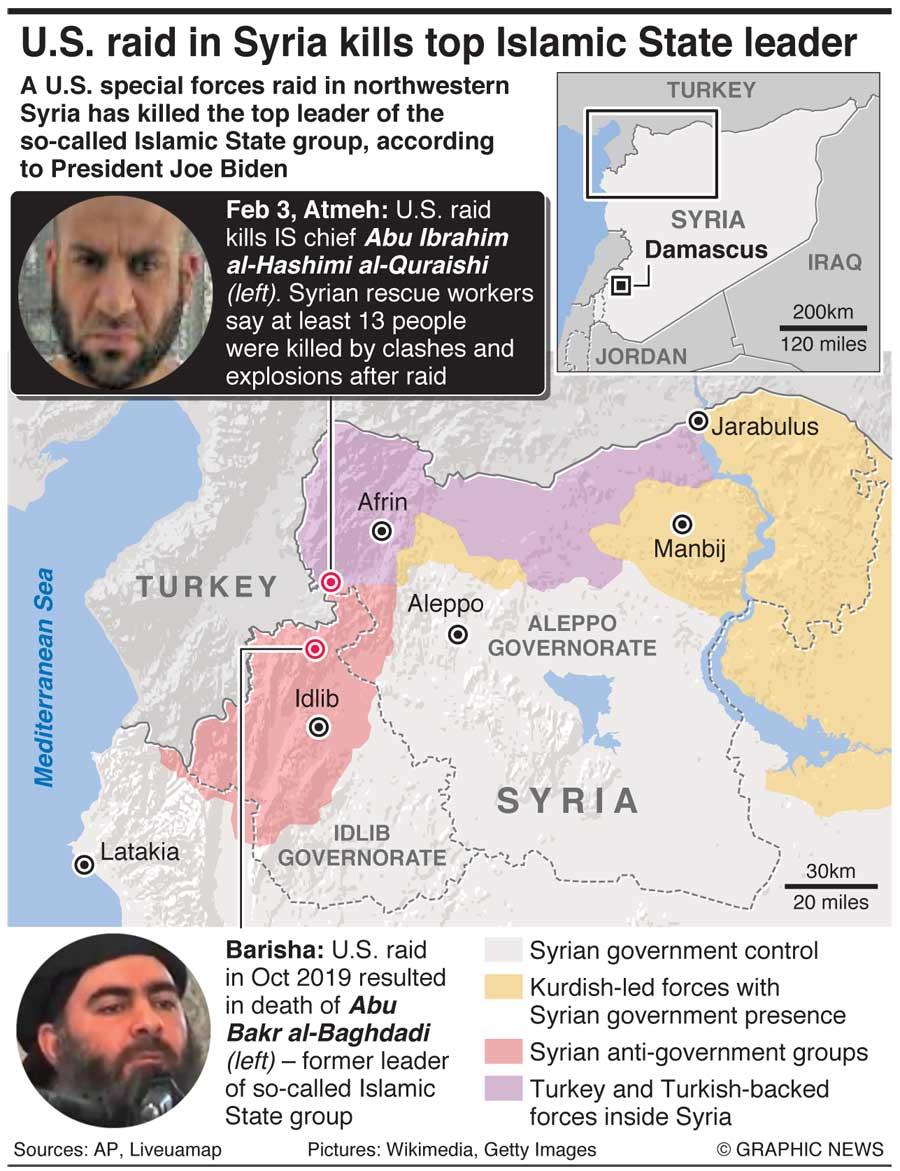11 Feb 2022 - {{hitsCtrl.values.hits}}
Until the United States military killed Abu Ibrahim al-Hashimi al-Qurayshi on February 3, many people had not heard his name or knew that he was the leader of the dreaded terrorist group – the Islamic State (IS) also known as ISIS (Islamic State in Iraq and Syria) or ISIL (Islamic State in Iraq and the Levant).
terrorist group – the Islamic State (IS) also known as ISIS (Islamic State in Iraq and Syria) or ISIL (Islamic State in Iraq and the Levant).
The news of the killing was left to be confirmed by US President Joe Biden. In a Twitter message, he announced: “Last night at my direction, U.S. military forces successfully undertook a counterterrorism operation. Thanks to the bravery of our Armed Forces, we have removed from the battlefield Abu Ibrahim al-Hashimi al-Qurayshi — the leader of ISIS.”
Al-Qurayshi’s predecessor Abu Bakr al-Baghdadi was also killed in a similar US military operation in October 2019 in Syria – months after in his last video message he vowed to reverse the military setbacks the ISIS had suffered. In the same video message, he praised the terrorists who set off bombs in churches and hotels in Sri Lanka on Easter Sunday. Since the death of al-Baghdadi, al-Qurayshi – who also went by the names of Abdullah Amir Mohammed Saeed al-Mawla and Hajji Abdullah Qardash – had led the group while remaining elusive.
Unlike al-Baghdadi, his 45-year-old successor released no video messages. He made no international news until he was killed last week along with his family, including six underaged children, in what the US military claimed was a suicide blast. The ISIS under al-Qurayshi’s command had no territory to rule. In contrast, al-Baghdadi was once in control of a self-declared caliphate the size of Britain – a territory that included Northern Iraq and eastern parts of Syria – while groups loyal to ISIS operated from many countries in West Asia, North Africa, Europe and other regions.
Al-Qurayshi took over the group at a time when it was losing its jihadi credentials and had difficulty in winning new recruits. Under his leadership, the ISIS posed no major threat to the US or its European allies, though in Iraq, there were regular terror attacks attributed to the ISIS.
Thus it comes as no surprise when the reaction to the death of al-Qurayshi in world capitals was muted or casual, although it may have given a boost to Biden’s sagging popularity.
However, going by al-Qurayshi’s past, it appears that there is more to his death than meets the eye. He was not killed; he was silenced, for he was privy to a secret project. Al-Qurayshi, who once served the Iraqi Army under Saddam Hussein, was a key leader of Iraq’s Sunni rebellion against the US occupation. He was captured in 2008 and sent to a US detention facility called Camp Bucca, where al-Baghdadi had also been detained.
It is at this camp, the grand plan for the setting up of the ISIS germinated, with al-Baghdadi emerging from obscurity to lead the world’s most dreaded terror group. At the camp, US officials allowed al-Baghdadi and al-Qurayshi to freely interact with hardcore detainees, enabling them to form a terrorist network later.
After his release in 2009, al-Baghdadi took over the leadership of al-Qaeda in Iraq (AQI) which had remained defunct since the death of Abu Musab al-Zarqawi and successors. Instead of going after the US-led occupation force, the Sunni Jihadi group AQI went after the Shiites in Iraq’s sectarian conflict which was manipulated by the US and British intelligence in keeping with the colonial policy of divide-and-rule.
In 2011, AQI changed its name to ISIS and entered the bigger geopolitical picture with an attack on Iraq’s high security Abu Ghraib prison. The too-good-to-be-true jail break saw 500 hardcore jihadists escaping. They were immediately sent to Syria where the US, its Arab Gulf allies and Israel had been backing all sorts of armed groups, including those with terrorist credentials, in their effort to topple Bashar al-Assad’s government.
For the Western nations, their Arab Gulf allies and Israel, the ISIS was then an asset. It was seen as the only group capable of militarily defeating the Assad regime.

28 Nov 2024 11 minute ago
28 Nov 2024 27 minute ago
28 Nov 2024 1 hours ago
28 Nov 2024 3 hours ago
28 Nov 2024 5 hours ago